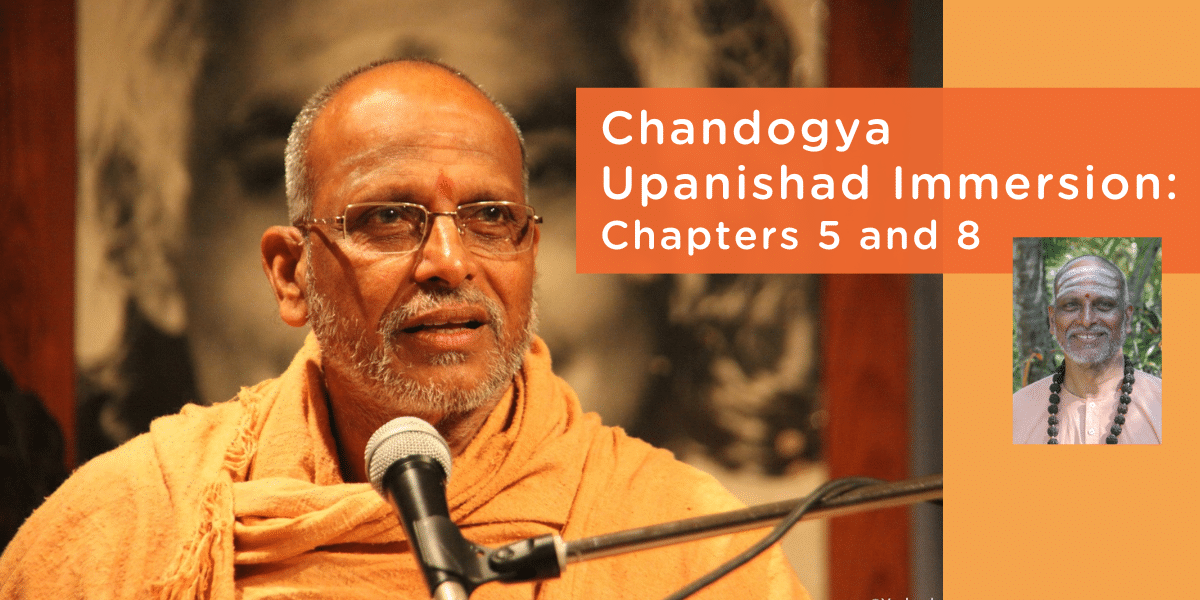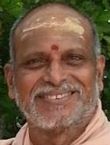
Chandogya Upanishad Immersion
Chapters 5 and 8
What is the Chandogya Upanishad Immersion?
It is one month of Vedanta Immersion offering a deep dive into the Upanishads.
What does the Chandogya Upanishad Immersion involve?
The Mahatma (great saint or sage), Swami Medhananda Puri, will be chanting the original Sanskrit verses in the daily morning class from 8 to 10 am. Following the chanting, Swami Medhananda Puri will will translate the verses to English and will teach the traditional commentary of Adi Shankaracharya and Ananda Giri. This method is the most authentic way to study and practice Vedanta and has been utilized for thousands of years in India to help spiritual speakers grasp the answers to such questions as: What is the Self? Who am I?
The practice of listening to a great saint or Mahatma relay the knowledge of the Vedas, ancient scriptural texts in India, has been the foundation for spiritual liberation for countless people. This immersion offers the doorway through which moksha or true freedom is attained.
It is not necessary to attend the entire 1.5 month immersion, but we ask that you if you do choose to join, to attend once per day during your stay—the immersion consists of 1 morning class from 8 am to 10 am, leaving plenty of time to attend both of the daily satsangs, one yoga class, both of the delicious vegetarian meals, as well as to enjoy the ashram grounds.
What is Vedanta?
Vedanta is a school of Hindu philosophy. It translates to the “end of the Vedas” or the “end of all knowledge”. It reflects the ideas that emerge from the study of the Upanishads, which deal with topics such as knowledge and liberation. Vedanta, or the study of the Vedas (the oldest scriptures of Hinduism), form the basis of Jnana Yoga, the Yoga of Knowledge.
What are the Upanishads?
The Upanishads are the most recent part of the Vedas, the oldest scriptures of Hinduism. While earlier parts of the Vedas deal with mantras, various benedictions, rituals, and ceremonies, the Upanishads deal with meditation, philosophy, consciousness, and various ontological knowledge (that is, the knowledge pertaining to the nature of being). In short, studying the Upanishads is studying what is Real and what is Unreal. It is the study of the Self.
What study Vedanta? Why partake in the immersion? What are the benefits of studying with a Mahatma like Swami Medhananda Puri?
This course is a classical example of the practice of Jnana Yoga (the Yoga of Knowledge), which consists of:
- Savanna, listening to the teachings of the Upanishads
- Manana, reflecting on their meanings
- Nididhyasana, divining into deep meditation on the insights that one receives from the reflection
Mahatmas such as Swami Medhananda Puri are among the most senior teachers of traditional Advaita Vedanta in India. They rarely—if at all—travel to the West/anywhere outside of India. In India, Mahatmas teach in the most traditional high Vedanta institutions such as the Kailash Ashram. These spaces are not even accessible to lay people!
10 years ago, Swami Swaroopananda, the acharya or spiritual director of our ashram, started to invite these Mahatmas to come to the Bahamas for a long stay (1-3 months) to teach in-depth intensive Vedanta Courses. He did so to allow the ashram’s Swamis, Brahmacharis, and senior staff the opportunity study Vedanta in the appropriate, traditional, and authentic way. These courses are open to all who are at the ashram (guests, karma yogis). They are offered for free and there is no tuition for attending the courses.
What will you study with Swami Medhananda Puri in Chapters 5 and 8 of the Chandogya Upanishad?
The fifth chapter of the Chandogya Upanishad opens with the declaration: “Indeed, he who knows the noblest and the best, becomes the noblest and the best.”
- In parts 5.3 through 5.10 of the Chandogya Upanishad, we are presented with “Pancagnividya”, also known the doctrine of “five fires and two paths in after-life”.
- The two paths of after-life, states the text, are Devayana – the path of the Devas (gods), and Pitryana – the path of the fathers.
- Part 5.11 opens with five adults seeking knowledge. The adults are described as five great householders and great theologians that come together to hold a discussion to answer the questions: what is our Self and what is Brahman
- The five householders approach a sage named Uddalaka Aruni. Uddalaka Aruna admits his knowledge is deficient, and suggests that they all go to the king Asvapati Kaikeya, who knows about Atman Vaishvanara. Vaisvanara literally means “One in the Many”.
The 8th chapter has 15 parts. This chapter concerns itself with the space of the heart, in which the worship of Brahman has been told. It details the story of the the Demon king Virochana who could not understand the teaching of Prajapati.
- Virochana misunderstood the teaching, mistaking the physical body for Atman.
- Even though Viroachana left after 32 years of penance, Indra had to further discriminate that the eternal immortal thing cannot be the physical body, mind, etc.
- Thanks to this discrimination, Virochana does penance for 101 years (32+32+32+5). Only in the fourth time of penance, does Virochana finally understand the teaching that the space in the heart is Brahman; also, that in the heart space, Brahman resides as Atman. After attaining this knowledge, he comes to understand that the knower thus will not come back to world.

Swami Medhananda Puri is a distinguished traditional teacher of Vedanta. In 1979, he joined the Kailash Ashram in Rishikesh, India, where he was initiated into the Kailash monastic order. Over the years, he served as acharya at the ashram and in 1987, he was promoted to Treasurer and Manager. He has mastered the Vyakaranam, Mimamsa, Nyaya, Sankhya sastras, Advaita philosophy, Bhagavad Gita, ten principal Upanisads, and Brahmasutras. A teacher of teachers, many of his students have become acharyas who are now teaching around the world.
Let's Stay In Touch
Join our email list to learn more about our in-person and online programs, courses, and free events.







